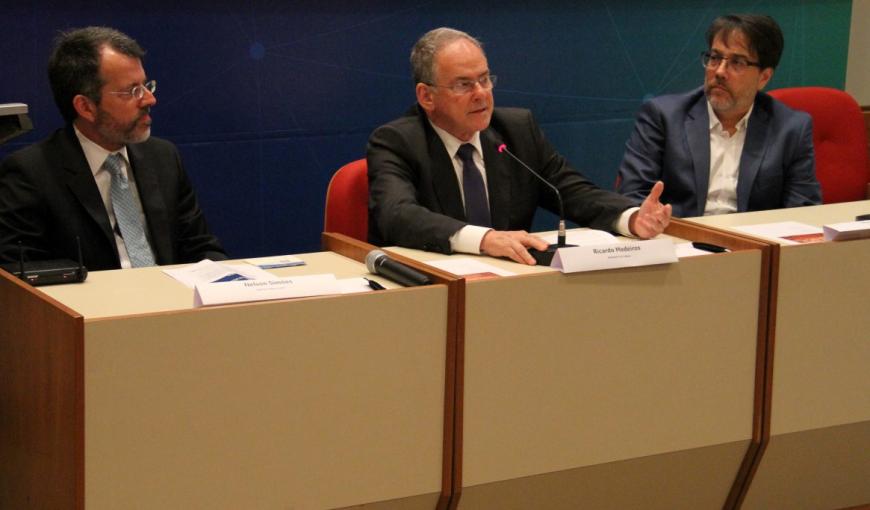RNP signs agreement with Furnas to expand high-speed internet offer
On Thursday (March 15th), the Brazilian National Research and Educational Network (RNP) and Furnas have signed a technical cooperation agreement for the sharing of infrastructure between the two institutions. The ceremony was held at the Brazilian Centre of Physics Research (CBPF) auditorium in Rio. The president of Furnas, Ricardo Medeiros, RNP’s director general, Nelson Simões, and the substitute director of CBPF, Marcio Portes de Albuquerque were present at the event.
The partnership will enable RNP to expand the capacity of the national academic network and connect education institutions, research centres, hospitals and cultural organizations at an initial speed of 100 Gbps. In all, 33 cities will benefit directly in nine Brazilian states, located in the region served by the Anel Sudeste (Minas Gerais, Rio de Janeiro, Espírito Santo, São Paulo, Mato Grosso, Federal District, Goiás, Paraná and Tocantins). For Furnas, the agreement with RNP will increase the offer and reliability of its telecommunications systems.
At the opening, the chief of staff of the Ministry of Education (MEC), Raphael Callou, who participated remotely from Brasilia, highlighted the benefit not only to academic institutions but also to hospitals and cultural organizations. Within the Connected Education Program for the universalization of broadband access in schools, MEC will invest BRL 271 million in the academic network by the end of 2018. "This initiative clearly shows the spirit of how public policies can be developed, by ensuring adequate structure for students in the scope of basic education and also to higher education institutions", said the chief of staff of the MEC.
In his presentation, RNP’s director general, Nelson Simões, highlighted that the new infrastructure, of very high performance, will create several possibilities for national education and scientific and technological research, such as the Sirius project, a new synchrotron light accelerator of the National Centre of Research on Energy and Materials (CNPEM). "We are transposing a national infrastructure in partnership with the electric sector. We expect it to grow to 100 Gbps capacity by 2020", he said.
The President of Furnas, Ricardo Medeiros, highlighted the social role of putting the company's optical infrastructure in the service of integrating the country's research centres and universities. "A few years ago, we had the opportunity to see the gigantism of this idea. Our intention was to provide internet to public schools at low cost. We are fulfilling our social role as a company and institution", said Medeiros.
The lighting of the optical routes will occur in two phases until 2020. Phase 1 will contemplate the route in the Rio-São Paulo-Federal District hub, going through Nova Iguaçu (RJ), Cachoeira Paulista (SP), Vargem Grande Paulista (SP), Guarulhos (SP), Campinas (SP), Araraquara (SP), Itumbiara (GO), Goiânia (GO) and Samambaia (DF). Phase 2 will light the route between Rio de Janeiro and Belo Horizonte, going through Macaé (RJ), Campos (RJ), Vitória (ES), Ouro Preto (MG) and São Paulo (SP). The initiative will benefit, by the end of 2018, 18 campuses of education and research institutions in ten cities in the Southeast.
The agreement with Furnas continues, through a scalable infrastructure, to the Veredas Novas Estaduais and Connected Education Programs, which are the result of a partnership between RNP and the Companhia Hidro Elétrica do São Francisco (Chesf). After completion of the first phase, scheduled for the first quarter of 2018, the capacity of the national academic network, operated by RNP, will be raised to the 100 Gbps level also in the Northeast region. This speed of data traffic is ten to hundred times higher than what is offered today to education and research institutions in most Brazilian capitals.
The Connected Education Program was launched by the MEC in 2017, in partnership with RNP, Chesf and state governments. The initiative supports strategies for internalizing optical networks in the states for education, in order to provide broadband internet to schools, research centres, universities, federal institutes, teaching hospitals and technology education centres, beginning in the Northeast, and possibly expanding to the entire country. For this, the MEC is investing in the technological evolution of the academic network for the next 20 years.
